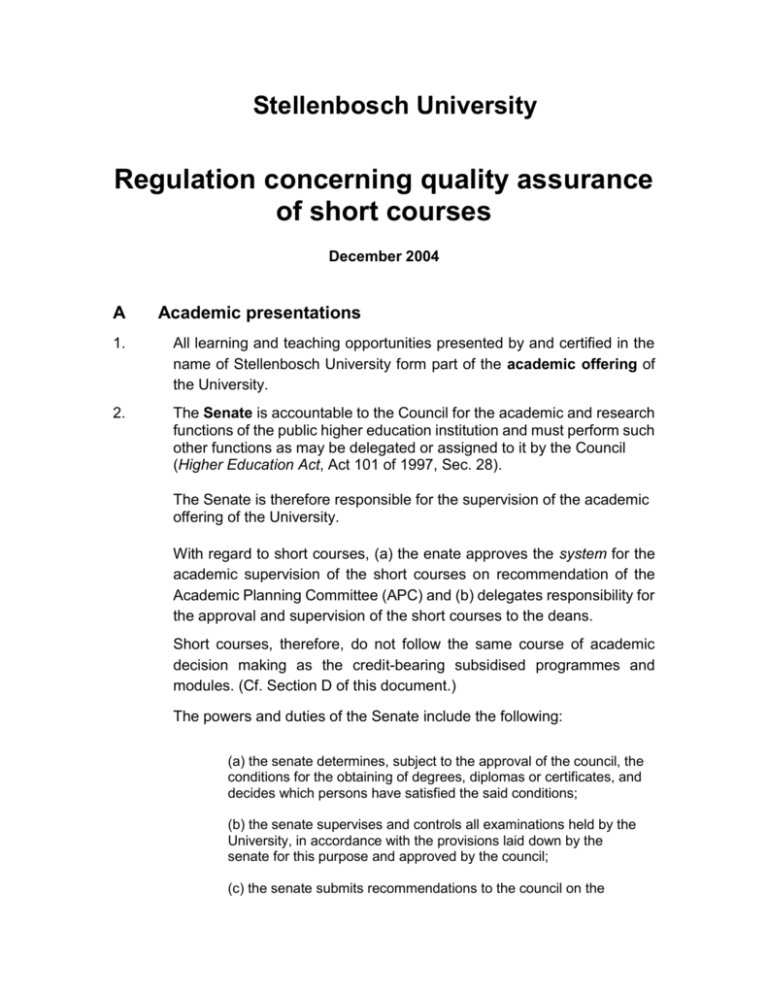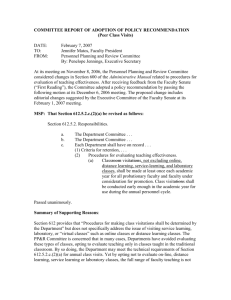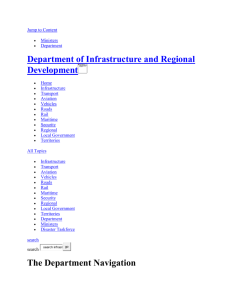Stellenbosch University
advertisement

Stellenbosch University Regulation concerning quality assurance of short courses December 2004 A Academic presentations 1. All learning and teaching opportunities presented by and certified in the name of Stellenbosch University form part of the academic offering of the University. 2. The Senate is accountable to the Council for the academic and research functions of the public higher education institution and must perform such other functions as may be delegated or assigned to it by the Council (Higher Education Act, Act 101 of 1997, Sec. 28). The Senate is therefore responsible for the supervision of the academic offering of the University. With regard to short courses, (a) the enate approves the system for the academic supervision of the short courses on recommendation of the Academic Planning Committee (APC) and (b) delegates responsibility for the approval and supervision of the short courses to the deans. Short courses, therefore, do not follow the same course of academic decision making as the credit-bearing subsidised programmes and modules. (Cf. Section D of this document.) The powers and duties of the Senate include the following: (a) the senate determines, subject to the approval of the council, the conditions for the obtaining of degrees, diplomas or certificates, and decides which persons have satisfied the said conditions; (b) the senate supervises and controls all examinations held by the University, in accordance with the provisions laid down by the senate for this purpose and approved by the council; (c) the senate submits recommendations to the council on the appointment of the dean of a faculty, (d) the senate may establish senate committees consisting of senate members, or senate members and other persons, and may assign any of its powers or duties to the committees or any official of the University, provided that the senate retains the power to amend or disregard any decision made by such committee or official. (Statute of the University of Stellenbosch, 8 April 2004, Government Gazette Notice no. 25850). 3. Regarding the content and quality assurance of the University's academic offering, the Senate acts via and on the recommendation of faculty boards and the Academic Planning Committee (APC). 4. The academic offering is divided into two groups of academic presentations: a) Credit-bearing programmes and modules b) B i which form part of the official Programme profile of the University as approved by the Department of Education, following the Department's Programmes and Qualification Mix (PQM) process, and ii which lead to the official qualifications of the University. Short courses i which include: short courses (in-house or for the public), certificate programmes, seminars and workshops, continuous professional development (CPD), programmes for which the University does not (directly) receive a subsidy from the state, and ii which are certified by the University by means of certificates of competence or certificates of attendance,. Academic quality assurance in general 5. All academic presentations (programmes, modules, short courses) which form part of the University's academic offering must satisfy the University's quality assurance requirements. 6. The University's quality assurance criteria for academic presentations include the following processes: a) Planning: all aspects of programme and module planning (including the academic level and standards, the curriculum, the research basis, etc). b) Approval by Senate on recommendation of the faculty board and the APC. c) Documentation of academic information (in the Yearbook). d) Funding. e) Recruitment and marketing. f) Selection of students (where applicable). g) Admission of students. h) Registration of students. i) Appointment, personnel. management and development of academic j) Delivery and student assessment (including the development of study material). k) Certification. l) Evaluation of programmes/modules/short courses. 7. Responsibility for the processes of academic quality assurance resides in the academic organisational structure of the University: a) the Senate, b) faculties as sub-committees of Senate, c) academic departments as functional organisational units within faculties, d) programme committees under the leadership of programme co-ordinators. 8. The regulations and procedures for academic quality assurance of subsidised credit-bearing programmes and modules are available in the University Statute, Senate resolutions, the Yearbook, the Guide for Deans, the Guide for Departmental Chairpersons and other official documents. 9. All credit-bearing modules of official programmes of Stellenbosch University are located in an academic organisational unit which has been instituted by the Senate for the purposes of presenting credit-bearing modules. 10. D The academic organisational unit, normally an academic department which resides within the University's academic decision-making structures, is responsible for the academic quality-assurance processes. Academic supervision and quality assurance of short courses 11. Responsibility for the quality assurance of short courses resides in Senate, which acts on recommendation of the APC. 12. The APC assesses the processes for the academic quality assurance of short courses and recommends those processes to Senate. 13. Senate delegates the responsibility for the approval of short courses to the deans. 14. Short courses presented under the name of the University are approved by the deans on recommendation of the departmental chairpersons. 15. Short courses presented by support service divisions are approved by the Responsibility Centre (RC) Head on the recommendation of the head of the relevant division. During the approval process, and at his or her own discretion, the RC Head may consult experts in an appropriate academic department. The RC heads therefore accept the responsibilities of the deans as specified in this document regarding short courses presented by support service divisions, and division heads accept the responsibilities of departmental chairpersons. 16. In the approval process, the Deans take into account the relevant academic, financial and personnel management issues. Please note that (a) research assistance, material, equipment or other facilities financed by the University, a statutory body or the State, (b) secretarial, administrative and technical support provided by staff members of the University and (c) official letterheads of the University may be used for purposes of a short course on condition that details of its use are provided to the dean for his or her approval of such use (on the recommendation of the departmental chairperson). (Further details of these aspects will be made available during 2005 when the Policy for Short Courses and the Business Plan for Short Courses are finalised.) 17. Control measures for the academic quality of short courses include the following: a) For every short course, a course leader who co-ordinates the activities on behalf of the University must be appointed by the departmental chairperson. b) The course leader must apply in writing to the departmental chairperson to present a short course. The following information must be provided in the application: i) the title of the course, ii) subject area, iii) credits, iv) NQF level, v) duration, vi) aim of course, vii) outcomes of the course, viii) in the case of courses that result in a certificate of competence: a) assessment system and/or methods, b) assessment criteria ix) delivery method(s), x) list of presenters with their curricula vitae containing (at minimum) their academic qualifications, from which institutions they were obtained, and their academic and professional experience, xi) frequency of presentations, xii) nature of the certificate to be awarded (certificate of competence or attendance), xiii) a budget. This information is presented to departmental chairpersons for consideration and recommendation to the dean. The dean approves the short course. 18. All short courses are registered on a central University register. This registration is a condition for the presentation of a short course. 19. Personnel a) The course leader is a duly appointed member of staff of Stellenbosch University (including members of staff appointed on joint platforms). b) The course leader is appointed by the departmental chairperson. c) In cases where the departmental chairperson acts as the course leader, the dean must approve this and appoint the chairperson as the course leader. d) The course leader must apply in writing to the departmental head to present a short course. The application must include information as specified in par. 17 of this document. e) Presenters with the required academic qualifications, expertise and capacity are recommended for every course by the course leader and are appointed by the departmental chairperson/division head. f) Staff of the University enjoy preference when presenters for short courses are appointed. g) Contract/part-time presenters must be accredited by the University for the purposes of the presentation of the course concerned. This happens once (a) the course leader and departmental chairperson have considered and recommended the presenters' curricula vitae and (b) the dean has approved the persons concerned to present the specified short courses. h) The course leader is responsible for the management of all the lecturers/presenters of a course. 20. Product development a) Product development is the responsibility of the course leader. In this context, "product" includes all aspects of the course, namely the intellectual property as embodied in the formulated aims, outcomes and assessment methods and criteria, the course material, as well as the results of any market research undertaken, the marketing material, etc. b) Course material must meet the normal requirements of the University regarding layout, format, medium, copyright clearance, etc. 21. Assessment a) The lecturers/presenters are responsible for the assessment of the course attendants' work. 22. Feedback and evaluation a) Feedback must be gathered from course attendants during and/or at the end of every short course. b) Short courses must be evaluated after every presentation. This means that the subject content, structure, admission requirements, study material and level are evaluated by the course leader and lecturers/presenters, that the feedback of the course attendants is considered and that the results of the evaluation process are used in the further development of the short course.








